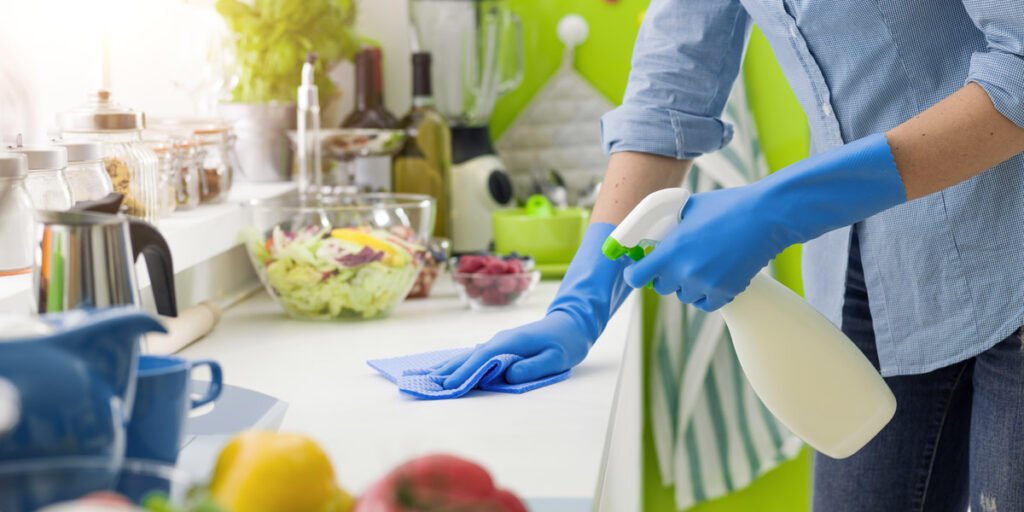Keeping the kitchen clean is one of my favorite home chores. I think I now love the name “Kitchen Lady.” As much as the living room might be considered important for guests’ visits and one of the more intriguing decorative parts of the home, the kitchen is vital and plays a key role in the home.
As an individual, I find kitchen chores to be therapeutic and moments of unleashing talents stored up in my head.
Here are seven healthy reasons to keep your kitchen clean.

1. To Avoid Food Contamination
One of the most serious issues concerning kitchen cleaning is a foodborne disease caused by deterioration or cross-contamination. You’re aware of safety precautions such as using separate cutting boards for meat and vegetables, constantly washing your hands after handling raw foods, and routinely cleaning the sink and worktops. These are only the fundamentals.
According to the Centers for Disease Control and Prevention [1] (CDC), around 76 million instances of food-borne disease occur in the United States each year. Although this contamination comes from a variety of sources, including food processing, the percentage is still frightening.
Salmonella, Campylobacter, pathogenic E coli, and Listeria are among the most common pathogens found in food. Others can be transmitted to food by unaware human carriers and then spread to others in the household. Hepatitis A virus, Staphylococcus aureus, Salmonella, Shigella sonnei, and rotavirus are among them. Although foodborne infections are considerably more likely to cause serious health problems in young children, elderly people, and those who are already unwell, even a minor bout of food poisoning is an unpleasant experience.
To lessen the risk of foodborne disease, try including the following tasks into your kitchen routine:
- Hands should always be washed before and after handling perishable items.
- Every time you use a cutting board, wash it with hot, soapy water. Cutting boards with extensive teeth marks or scraping should be discarded.
- When you contact your nose, mouth, or eyes, wash your hands.
- After preparing raw meat or eggs, wash your hands thoroughly.
- Keep cleaning agents away from food preparation areas.
- Do not forget to clean all of your food preparation tools, such as meat thermometers, measuring cups, measuring spoons, can openers, sieves, colanders, blenders, wooden spoons, cookie sheets, and spoon rests. It should be cleaned if it comes into contact with perishable items.
- Throw off spoiled food as soon as possible. Never leave leftovers in the fridge for more than four days.
- Perishable foods should be refrigerated after no more than two hours at room temperature.
If a food item seems or smells odd, discard it.
2. Limit the Use of Harsh Chemicals
I understand that things become quite disgustingly dirty, it is plausible to say that massive equipment is required. However, since the cleaning agents used in kitchens and bathrooms kill germs are made up of a massive list of potent chemicals that accomplish the job but can they might also leave residue behind.
This residues might be harmful to the body, humans are not immune to the biological effects of strong anti-bacterial chemicals, and maintaining a clean environment using safe procedures can be difficult.
But one thing is certain. A consistent cleaning routine keeps germs under control, resulting in fewer of them to deal with. Whether you choose to go green or utilize a more aggressive, strong choice, the chemicals you use should be in small quantities at all times.
You might also enjoy the concept of cleaning the kitchen using natural chemicals such as white vinegar, a gentle but effective acid, and baking soda, a light abrasive.
Whether you choose to use this or not, frequent cleaning will result in lower concentrations of harsh chemicals and less possibility for unsafe exposure than a weekly cleaning marathon.
3. For Safe Entertainments of Guest
Imagine a scenario where you have guests coming into the kitchen to help out with doing the large dishes and catching up with old-time, you may prefer to have the kitchen all to yourself.
Unarguably there will be expectations of having your kitchen spotless as your living room but the kitchen is the heartbeat of the home.
Therefore, you might want to keep your kitchen clean and dry for the unexpected visits from guest.
4. Store Food more Effectively
As we all know, the kitchen is all about food storage and preparation, therefore it is a good idea to have an effective and consistent food maintenance approach.
Milk, for instance, could go bad quickly, so keeping your fridge clean and tidy will help you keep track of your food supplies and utilize them before they spoil.
Decaying food emits aromas and, in some cases, microorganisms that can hasten the decay of other foods, and leaving spills in place increases the danger of inhibiting micro-organism.
Another place to keep an eye on is the cupboard. Although canned foods are reasonably indestructible, baking powder, spices, nuts, and other ingredients should be kept under close supervision.
Keep an eye out for bug activity and vacuum up any flour or other food crumbs or dust while you are at it. Food that has been spilled, spoiled, or ignored can produce armies of bacteria and attract insect invaders.
If you wait until the next holiday to start cleaning, your bread may mold and a thriving community of weevils may move into your flour and dry pasta.
5. Make Kitchen Preparation Easier
You’ll probably admit that cleaning when you’re tired or rushed isn’t excellent cleaning. Sticky countertop residue can be very annoying and exhausting. Hasty cleaning will almost certainly require more time in the long run.
Having one good tabletop cleaning (the kind where you have to take everything off the surface and perform the clean properly) may take more than 10 minutes.
However, having to drag a cloth around your tabletop appliances, mail basket, and bread box twice a day for a quick clean could add up to a lot more minutes and save you more stress.
6. To Prevent Domestic Accidents:
Do you know that cleanliness is more than simply a decorative concern? It is more about safety.
Drips on the floor from the previous kitchen activity such as washing could cause someone to trip, and an oil slick on the stove or cooker top could ignite a grease fire.
Water, high heat, electricity, and sharp objects all come into close proximity in the kitchen, and the best way to handle this potentially dangerous environment is to keep it clean and tidy.
Keeping the kitchen tidy may help you avoid disaster.
7. Building Character for Young ones
Growing up, I observed my mother cleaning and ensuring that every aspect of the kitchen is dried and neatly tidied before, during, and after cooking.
The truth is that whatever you do – or do not do – has an impact on your children. They won’t hate you if you never wipe out the ice dispenser tray, but they might pick up your less ideal cleaning practices later in life.
Cleanliness may not have the holy significance that past generations of housekeepers placed on it, but it is an excellent habit to teach your children by example.
Sharing Is Caring!






